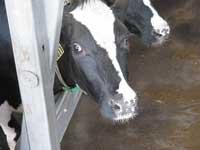Lynn Frewer: "The public wants open and transparent information"
In the UK you have just passed the BSE epidemic (mad cow disease). So far this type of disease was not known. Is it comparable to AIDS?
The first problem with BSE is that its effect on humans is unexpected. We do not know what can affect the human population. It is a very unpleasant disease, people die in very painful conditions. The authorities said there was no danger, but public concern reached official institutions.

Another major problem in Europe is the fight against GM foods. However, no data is available on your possible health condition. But in the United States the answer has been much better. What happens?
In the United States they are increasingly concerned about biology in general, the field of biological weapons in particular. Analysis of the situation in the 1990s. First, all the information given to the public equated these new foods with traditional ones. On the other hand, people's real concerns were not taken into account, but the main concerns were their possible impact on the environment and health. It is an example of this relationship between BSE and CJD (Creutzfeldt-Jakob disease, mad cow disease in humans). Finally, I think that when regulating this area was ruled out. Scientists claimed that people's concerns were irrational and, of course, the public got angry. From there came the crisis.
People began to wonder why I was developing this type of food. In the case of GM soy, the profit seems to be being perceived by US producers and the risks by European consumers.
Another thing that can pose a health risk is the mobile phone, especially antennas. But people see no problems. What is the difference?
People choose what they want. Try to counterpose advantages and risks. In the case of phones, the advantages of the person's life are enormous. However, in the UK there has been a doubt about it. At least, people want to know how far the risk goes if an investigation has been conducted or not. But do not forget that you also see very spectacular advantages.
Continuing with food, perhaps the fastest response is a water pollution problem. Why can't this answer be equated with that of other types of food like vegetables?
The public is very concerned, especially because water is an irreplaceable product. When pollution occurs, even if it has a very local effect, many people should be warned. Therefore, it is potentially catastrophic. Among other things, it affects children, so the concern arises in much of the population. With vegetables, instead, it is much easier to protect yourself from the contaminated.
When a food crisis occurs, the media make two types of treatment of the new, political and social. In your opinion, with these two positions, how should the crisis information be?
The public wants the information to be open and transparent. He wants to know the way forward. The media has an obligation to tell what is happening and what is political responsibility. I think it is very important that the media disseminate the correct information, although sometimes that implies ignorance and doubts.

However, providing direct information sometimes requires great scientific knowledge of people.
But there are also many experts in scientific communication. Some are very good at making science and technology understandable to the general public. These people should enter the community of journalists. In the UK there is a need to comprehensively expand scientific controversies. If scientists have been able to take a step, journalists will also have to be.
Information on BSE increased greatly in the media in March 1996, and from there the crisis spread. So what causes the crisis, the media or the disease itself?
The work of the media reveals the crisis. This must be understood: in the new crisis, if people have not received any views on risk, the first information will have a huge social impact. Then, at least in the UK, the media begins to look for their political and guilt responsibilities. In general, people will not change their minds after those first days. When we enter a crisis we need information very quickly.
What if there were no media?
If there were no media, I believe that those who regulate risk should comply with the work of the media. For example, in Geneva in 1986 in the radiation crisis… things had to be organized very quickly. I remember that in Sweden there were many problems with water. Most people receive information through television.
One way or another, someone has to do that job. In the absence of media, the government will have to act on them, but this means that it should allow non-conformity, inform previously about risk, make very transparent decisions and make them understandable to the public. People should be kept from saying they make the decisions that are made, “What are these doing? ".

If doubts and ignorance are hidden, people will soon wonder if the truth is told. The public does not accept the lack of transparency and hidden truths. In the UK, for example, the public is increasingly angry and that situation must change in some way.
Which of the media considers it to have the greatest impact on science-related issues?
Today is certainly television. The press and all media are necessary, but broadcasting the idea on television is faster and easier. The message is easily transmitted to the viewer. But once this first phase has ended and the public's opinion has emerged, for those who want to deepen more, written information is more effective, since, in general, television does not offer much depth.
Buletina
Bidali zure helbide elektronikoa eta jaso asteroko buletina zure sarrera-ontzian











